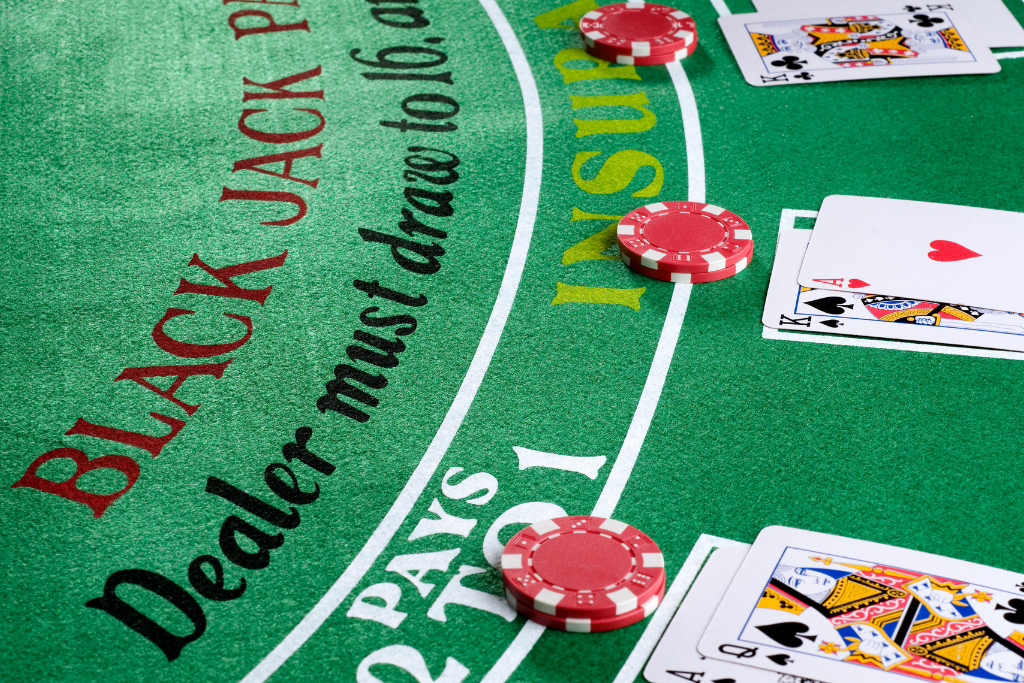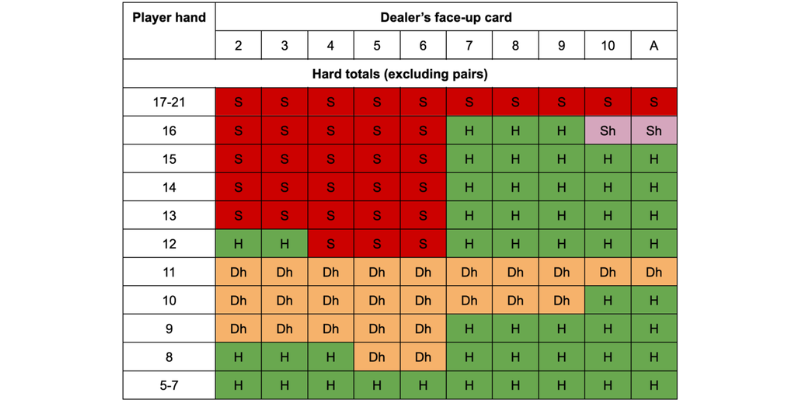
Best Casinos to Play Black Jack
Black Jack Strategies
Black Jack strategies are actions you can take after receiving the first two cards: hit, stand, double down, and split pairs. Let's discuss all the cases.
Always hit if…
If the sum of your cards is 8, always hit. You have no risk because the highest card value is 10 (since with an ace, you can choose whether it will be 11 or 1). 18 does not exceed 21 points, so you cannot lose. The same goes for nine – you can always take another card. However, when your card sum is 9, and the dealer's face-up card is between 3 and 6 (inclusive), it's better to try doubling down. The chances of winning are quite high, and the winnings in this case are even greater.
It's almost always worth taking another card when you have 12. Although twelve poses a significant risk since 10 points would mean losing, winning with 12 is also practically unrealistic. Only if the dealer has 4, 5, or 6 is it worth holding and not taking another card.
When the dealer's face-up card is 7 or higher (including an ace), it's worth hitting almost always, except if you have at least 17. Then you should stop and hope the dealer doesn't succeed. Also, if you have 11, it's worth not only hitting but better to double your bet – there's a very high chance of getting 21. If you have 10, hit if the dealer has 10 or an ace; otherwise, it's better to double down.

When you have an ace…
When one of your cards is an ace, you should slightly change your strategy. This is because you have a card whose value you can choose – 1 or 11.
When you have an ace and 9, always stand. Don't be naive and expect miracles, as it's rare to get better than 20 points.
With an ace and 8, also stand almost always, unless the dealer has a 6. In this case, statistically, it might be beneficial to double down. If that's not possible, stand. Simply hitting is not worth it.
With an ace and 7, you have 18 points or 8, so you can try to take a bit of a risk. If the dealer has 9, 10, or an ace, hit. If 7 or 8, there's no point in risking, so stand, and if it's between 2 and 6, double down or stand.
When you have an ace and 6, it's worth considering hitting or doubling down – standing is not worth it. Hit when the dealer shows a 2 or from 7 to an ace. When the dealer shows 3-6, it's worth doubling down.
When you have an ace and 5 or an ace and 4, hit unless the dealer has 4, 5, or 6 – then double down. And when you have an ace and 2 or an ace and 3, hit in all cases unless the dealer has 5 or 6 – then it's worth doubling down.
When you have pairs…
The Black Jack strategy with splitting pairs is also different from other situations. Many players mistakenly believe that pairs should always be split. This is not true; we provide information and a table on when to split pairs and when not to.
The most important thing to remember is that it's always worth splitting aces and never splitting tens. Everything else is recommendations that can essentially vary depending on the specialists providing them.
It's worth splitting nines always, except when the dealer has 7, 10, or an ace. 7 means the likelihood that the dealer will have 17 (10 points are more common than any other numbers), so this number stands out a bit.
It's suggested to always split eights because 16 is quite low, and separate eights have a good chance of increasing your points.
It's worth splitting sevens when the dealer has relatively low cards (from 2 to 7). If the dealer shows an 8 or better (including an ace), don't risk splitting.
It's worth splitting sixes only if the dealer has less than 7.
We never recommend splitting fives. Separate fives usually bring fewer points and lead to a loss. Meanwhile, fives left in a pair make 10, which is quite an attractive number in Black Jack.
It's also usually not worth splitting fours, so we suggest leaving two fours together.
Split threes and twos if the dealer has 7 or less. Otherwise, leave them together.
Black Jack Strategy Summary
There is a lot of information in this simple strategy, so it's not easy to remember. Playing online, it's easy to have these three tables in front of you, but if you go to a regular casino, no one will allow you to use such tables, and you will be quickly asked to leave the casino.
To remember, you should practice a lot; gradually, most combinations become memorized, and some seem very logical, so for those who play Black Jack a lot, it becomes a minor problem.
This is just a simple, basic Black Jack strategy. When thinking about how to win Black Jack consistently, you should use more data. There are no hundred percent strategies and never will be, so believing in flashy advertisements about how someone managed to cheat the system and extract thousands from the casino daily is not worth it – it's just a search for the naive. In the end, the casino always wins because the casino has at least a slight advantage in all games.
By applying this strategy and doing some mental calculations, remembering the cards already played, you can increase your chances of winning. However, counting while playing Black Jack is not easy, especially when there are many external distractions in the casino – noise, constantly offering waiters, other players trying to chat, etc. Despite everything, with experience, the Black Jack game becomes simpler and more successful if played wisely and cautiously.





